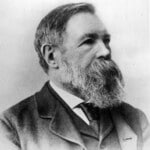(Extract)
About the text:
From: On Colonies, Industrial Monopoly and Working Class Movement, Futura, 1972, 57 p., p. 38-39
Written on 22nd February 1874,
published in “Der Volksstaat”
… As regards the workers it must be stated, to begin with, that no separate political working-class party has existed in England since the downfall of the Chartist Party in the fifties. This is understandable in a country in which the working-class has shared more than anywhere else in the advantages of the immense expansion of its large-scale industry. Nor could it have been otherwise in an England that ruled the world market; and certainly not in a country where the ruling classes have set themselves the task of carrying out, parallel with other concessions, one point of the Chartists’ programme, the People’s Charter [14], after another. Of the six points of the Charter two have already become law: the secret ballot and the abolition of property qualifications for the suffrage. The third, universal suffrage, has been introduced, at least approximately; the last three points are still entirely unfulfilled: annual parliaments, payment of members, and most important, equal electoral areas.
Whenever the workers lately took part in general politics in particular organisations they did so almost exclusively as the extreme left wing of the “great Liberal Party” and in this role they were duped at each election according to all the rules of the game by the great Liberal Party. Then all of a sudden came the Reform Bill which at one blow changed the political status of the workers. In all the big cities they now form the majority of the voters and in England the Government as well as the candidates for Parliament are accustomed to court the electorate. The chairmen and secretaries of Trade Unions and political workingmen’s societies, as well as other well-known labour spokesmen who might be expected to be influential in their class, had overnight become important people.
They were visited by Members of Parliament, by lords and other well-born rabble, and sympathetic enquiry was suddenly made into the wishes and needs of the working-class. Questions were discussed with these “labour leaders” which formerly evoked a supercilious smile or the mere posture of which used to be condemned; and one contributed to collections for working-class purposes. It thereupon quite naturally occurred to the “labour leaders” that they should get themselves elected to Parliament, to which their high-class friends gladly agreed in general, but of course only for the purpose of frustrating as far as possible the election of workers in each particular case. Thus the matter got no further.
Nobody holds it against the “labour leaders” that they would have liked to get into Parliament. The shortest way would have been to proceed at once to form anew a strong workers’ party with a definite programme, and the best political programme they could wish for was the People’s Charter. But the Chartists’ name was in bad odour with the bourgeoisie precisely because theirs had been an outspokenly proletarian party, and so, rather than continue the glorious tradition of the Chartists, the “labour leaders” preferred to deal with their aristocratic friends and be “respectable,” which in England means acting like a bourgeois. Whereas under the old franchise the workers had to a certain extent been compelled to figure as the tail of the radical bourgeoisie, it was inexcusable to make them go on playing that part after the Reform Bill had opened the door of Parliament to at least sixty working-class candidates.
This was the turning point. In order to get into Parliament the “labour leaders” had recourse, in the first place, to the votes and money of the bourgeoisie and only in the second place to the votes of the workers themselves. But by doing so they ceased to be workers’ candidates and turned themselves into bourgeois candidates. They did not appeal to a working-class party that still had to be formed but to the bourgeois “great Liberal Party.” …
—–
[14] See page 10 in Gotfred Appel: Class Struggle and Revolutionary. Situation, Futura,. 1971.
MEOB p. 503.
The complete text can be found online at Marxist Internet Archive, MIA.

























